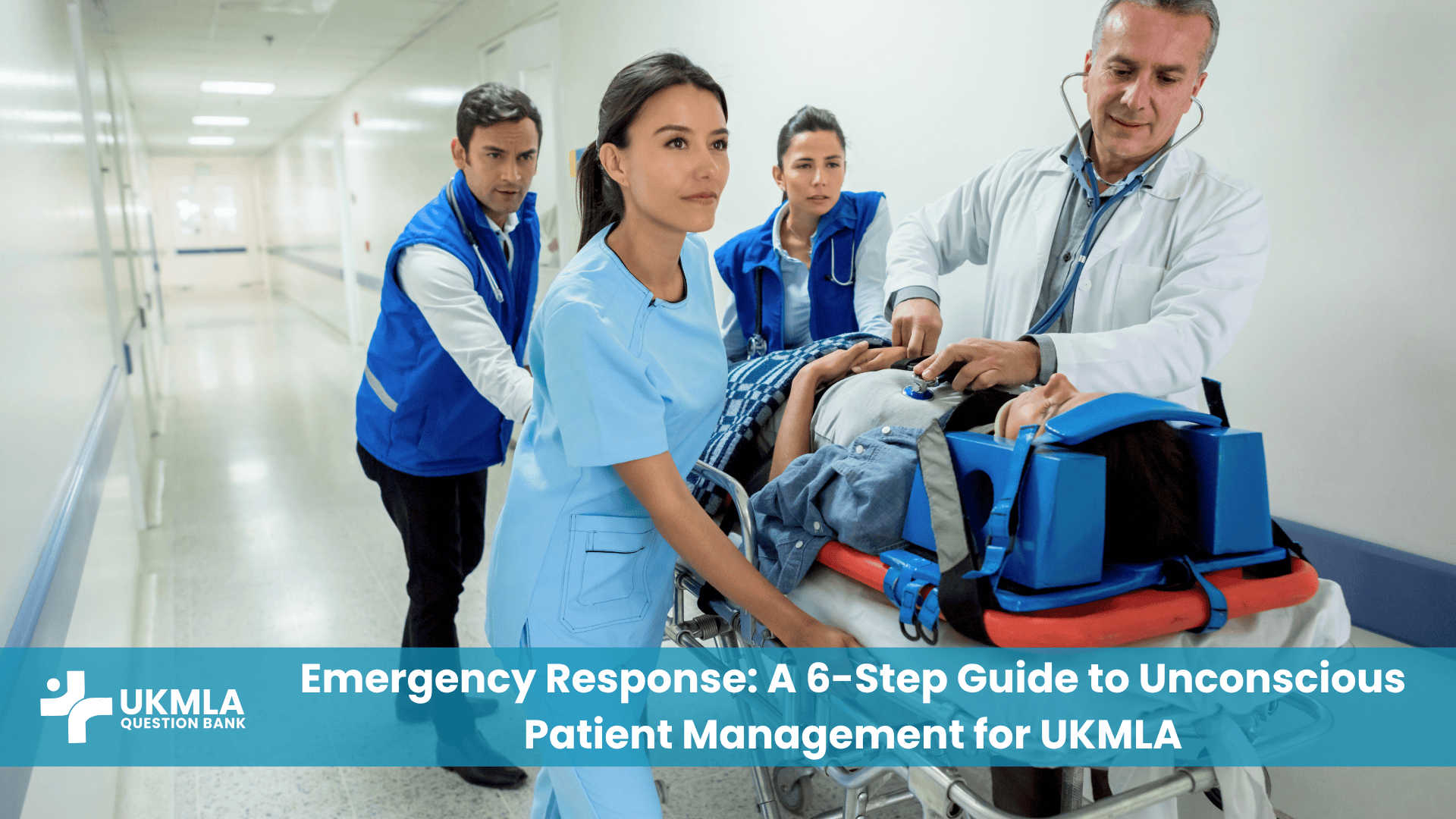The United Kingdom Medical Licensing Assessment (UKMLA) Applied Knowledge Test (AKT) is a critical milestone for medical students and graduates aiming to practice in the UK. This comprehensive examination assesses your ability to apply medical knowledge in a clinical context, ensuring you meet the necessary standards for safe and effective patient care. Preparing for this assessment can feel like a monumental task, given the breadth of the curriculum and the high stakes involved. However, with the right approach and dedicated effort, achieving a high score is well within your reach.
This blog post is designed to be your definitive guide to mastering the UKMLA AKT. We’ll delve into proven strategies, from understanding the exam’s nuances to crafting an effective study plan, leveraging the best resources, and adopting exam-day tactics that will set you up for success. Whether you’re just starting your preparation journey for this crucial test or looking to refine your approach, the insights here will provide actionable steps to help you confidently tackle the UKMLA exam and secure that coveted high score. Let’s explore how you can turn this challenge into a stepping stone for your medical career.
Key Takeaways
Before we dive deep, here’s a quick overview of the essential strategies for success in the assessment:
Understand the Exam: Familiarize yourself thoroughly with the UKMLA AKT format, content blueprint, and assessment objectives.
Strategic Planning is Crucial: Develop a realistic and sustainable study schedule tailored to your learning style and the exam syllabus.
Active Learning Beats Passive Study: Engage with the material through practice questions, case-based scenarios, and active recall techniques.
Leverage Quality Resources: Choose high-yield resources, especially comprehensive question banks for the AKT, to focus your efforts effectively.
Practice Under Exam Conditions: Regularly take timed mock exams to build stamina, refine time management, and reduce anxiety.
Analyze and Learn from Mistakes: Every error in practice is an opportunity to strengthen your understanding for the actual test.
Prioritize Well-being: Maintain a healthy lifestyle with adequate sleep, nutrition, and stress management techniques throughout your preparation.
Understanding the UKMLA AKT Landscape: Your First Step to a High Score
Successfully navigating your preparation for the AKT begins with a solid understanding of what the exam entails. Knowing the structure, focus, and common pitfalls will allow you to tailor your study methods effectively and approach the medical licensing assessment with confidence.
What is the UKMLA AKT? Core Components and Assessment Areas
The UKMLA AKT is a computer-based, multiple-choice examination designed to assess your clinical knowledge and its application. It primarily uses single-best-answer (SBA) questions, requiring you to select the most appropriate response from a list of options, often based on a clinical vignette. The General Medical Council (GMC) outlines a content map or blueprint which details the areas covered, typically encompassing a wide range of medical disciplines and patient presentations.
Key assessment domains include, but are not limited to:
Diagnosis: Identifying the most likely diagnosis based on patient history, symptoms, and signs.
Investigation: Selecting appropriate diagnostic tests and interpreting their results.
Management: Determining the best course of action for patient care, including pharmacological and non-pharmacological interventions.
Clinical Problem Solving: Applying medical knowledge to complex and often multifaceted patient scenarios.
Professionalism, Ethics, and Law: Understanding the legal and ethical frameworks governing medical practice in the UK.
Understanding these core components is essential for effective AKT revision.
Why a High Score in this Assessment Matters for Your Medical Career
Achieving a high score in the UKMLA AKT is more than just a pass; it can significantly influence the trajectory of your early medical career. While the primary goal is to meet the threshold for licensure, a strong performance can enhance your application for foundation programme posts, demonstrating your competence and readiness for clinical practice. A high score can open doors to more competitive specialties or locations.
Furthermore, excelling in this crucial test provides a strong foundation of applied knowledge that will serve you well as you transition into your role as a junior doctor. It boosts your confidence in managing patients and making sound clinical decisions. Think of it as an investment in your future capabilities and professional standing.
Common Challenges Faced by Students Preparing for the UKMLA AKT
Many students find preparation for this exam daunting due to several common challenges. The sheer volume of medical knowledge to cover can feel overwhelming. Time management, both during study and in the exam itself, is another frequent hurdle. A critical challenge is shifting from rote memorization of facts to the application of knowledge in clinical scenarios, which is the core focus of the applied knowledge test.
Other difficulties include maintaining motivation over a long study period and dealing with exam-related anxiety. Recognizing these potential obstacles early allows you to implement strategies to overcome them proactively. For more insights, you might find our article “UKMLA Mistakes to Avoid: Your Ultimate Guide to Improving Your Score in 2025” useful.
Common Challenge | Proactive Solution |
Vastness of Curriculum | Prioritize high-yield topics using the UKMLA content map; break down study into manageable chunks. |
Time Management During Exam | Practice extensively with timed questions and full mock exams; develop a strategy for pacing. |
Difficulty Applying Knowledge | Focus on case-based learning and practice questions that require clinical reasoning. |
Maintaining Motivation | Set realistic short-term goals, study with peers, reward progress, and remember your long-term career aspirations. |
Exam Anxiety | Practice mindfulness, simulate exam conditions, ensure good sleep and nutrition, and build confidence through preparation. |
Crafting Your Winning UKMLA AKT Study Plan
A well-structured study plan is the backbone of successful preparation for the AKT. It provides direction, ensures comprehensive coverage of the syllabus, and helps you manage your time effectively, ultimately paving the way for a high score on the UKMLA AKT.
Setting Realistic Goals and a Sustainable Study Schedule
Begin by setting SMART (Specific, Measurable, Achievable, Relevant, Time-bound) goals for your UKMLA AKT journey. For example, instead of “study cardiology,” a SMART goal would be “complete the cardiology section of the UKMLA blueprint, including 50 practice questions, by the end of next week.” Break down the extensive syllabus into smaller, manageable topics and allocate specific time slots for each in your study schedule.
Your schedule should be sustainable. Highlight: Students who create and stick to a detailed study schedule are reportedly more consistent in their preparation, which often correlates with better outcomes on the assessment. Balance intensive study periods with adequate breaks, exercise, and social activities to prevent burnout. Consistency over a longer period is more effective than cramming.
Choosing the Right Resources for the AKT: Quality over Quantity
The market is flooded with resources for medical exams, but for the UKMLA AKT, quality trumps quantity. Focus on resources that align closely with the UKMLA content blueprint and question style. Key resources include reputable textbooks for foundational knowledge, clinical guidelines (e.g., NICE), and, most importantly, high-quality question banks for the AKT.
When evaluating resources, consider their accuracy, relevance, and the quality of explanations provided, especially for practice questions. Peer recommendations and reviews can be helpful, but always cross-reference with the official GMC guidance on the UKMLA exam. For a deeper dive, explore our guide on “The GMC UKMLA Content Map: Your Blueprint for Success“.
Resource Type | Pros | Cons | Best For |
Question Banks | Simulates exam, identifies weak areas, improves timing, active recall | Quality varies, can be expensive | Core of AKT revision, regular practice |
Textbooks | In-depth knowledge, foundational understanding | Can be time-consuming, may not be exam-focused | Building strong fundamentals, referencing specific topics |
Online Courses | Structured learning, expert guidance, interactive elements | Cost, requires self-discipline | Guided learning, supplementing self-study |
Peer Study Groups | Collaborative learning, motivation, discussing complex topics | Can be distracting if not focused, varying levels of commitment | Reinforcing knowledge, practicing explanations |
Clinical Guidelines | Authoritative, up-to-date best practices | Can be dense, may require interpretation for exam context | Understanding current management protocols relevant to the assessment |
The Power of Active Learning Techniques for the UKMLA AKT
Passive learning, such as simply reading textbooks or watching lectures, has limited effectiveness for long-term retention and application – skills crucial for the UKMLA AKT. Embrace active learning techniques to engage more deeply with the material. This means transforming information into usable knowledge.
Effective active learning techniques for your exam preparation include:
Practice Questions: The cornerstone of active learning for the AKT.
The Feynman Technique: Explaining complex concepts in simple terms, as if teaching someone else.
Spaced Repetition: Revisiting topics at increasing intervals to enhance long-term memory.
Self-Testing: Regularly quizzing yourself on material you’ve covered.
Mind Mapping: Visually organizing information to see connections between concepts.
Case-Based Learning: Working through clinical scenarios to apply theoretical knowledge.
By actively processing and applying information, you’ll build a more robust understanding necessary for mastering this crucial assessment.
Mastering UKMLA AKT Content: Key Subject Areas and Revision Tactics
Efficiently covering the vast UKMLA AKT syllabus requires smart revision tactics and a focus on high-yield areas. It’s not just about what you study, but how you study it, ensuring knowledge is retained and readily applicable during the UKMLA exam.
High-Yield Topics: Focusing Your Efforts Effectively
While comprehensive coverage is ideal, some topics and clinical presentations appear more frequently in medical licensing exams like the UKMLA AKT. Identifying these “high-yield” areas allows you to allocate your study time more strategically. The official UKMLA content map provided by the GMC is your primary guide here; analyze it to understand the weighting of different domains and conditions.
Focus on common diseases, emergency presentations, and conditions with significant public health impact. For example, cardiovascular diseases, respiratory conditions, diabetes, and common infections are often central. > “The art of preparation lies not just in covering all topics, but in mastering the most frequently tested ones with depth and clarity.” This approach ensures you are well-prepared for a significant portion of the applied knowledge test.
Integrating Clinical Knowledge with Basic Sciences for the AKT
The UKMLA AKT emphasizes the application of medical knowledge. This often requires integrating your understanding of basic sciences (like physiology, pathology, pharmacology) with clinical presentations and management. Don’t study these in isolation. For instance, when learning about a cardiac drug, understand its mechanism of action (pharmacology), the physiological changes it induces, and the pathological conditions it treats.
This integrated approach helps you answer “why” questions, not just “what” questions, which is crucial for tackling complex clinical vignettes in the UKMLA exam. Connecting the dots between foundational science and clinical practice will deepen your understanding and improve your clinical problem solving skills, leading to a better score on the assessment.
Effective Note-Taking and Knowledge Consolidation Strategies
Effective note-taking is about creating concise, organized, and easily reviewable summaries, not just transcribing lectures or textbooks. Techniques like the Cornell Note-Taking System, creating mind maps, or developing flashcards for key facts and concepts can be very useful for AKT revision. Focus on synthesizing information rather than passively copying it.
Highlight: Regularly revisiting and condensing your notes into concise summaries can significantly boost long-term retention for the UKMLA AKT. Knowledge consolidation involves periodically reviewing your notes, practice question explanations, and other materials to reinforce learning. Spaced repetition systems can be particularly effective for this, ensuring that information moves from short-term to long-term memory.
The Crucial Role of Practice Questions and Mock Exams for UKMLA AKT Success
When it comes to preparing for the UKMLA AKT, there’s no substitute for extensive practice with questions that mirror the style and difficulty of the actual exam. Engaging with question banks for the AKT and simulating exam conditions through mock tests are pivotal strategies for this assessment.
Why UKMLA AKT Question Banks are Your Best Friend
High-quality question banks for the UKMLA AKT are indispensable tools. They allow you to familiarize yourself with the single-best-answer format and the way clinical information is presented in vignettes. Working through a large volume of questions helps you identify patterns, understand common distractors, and hone your clinical problem solving skills.
Moreover, question banks are excellent diagnostic tools. By reviewing your performance, you can pinpoint your knowledge gaps and areas of weakness, allowing you to focus your subsequent study more effectively. Many question banks, like those at UKMLAQuestionBank.com, offer detailed explanations for both correct and incorrect answers, which is crucial for learning. This iterative process of practice and review is key to mastering the UKMLA AKT.
Simulating Exam Conditions: The Value of Timed Mock Tests
While individual practice questions are useful, taking full-length, timed mock exams is essential for building exam stamina and practicing your pacing strategy. The UKMLA AKT is a lengthy examination, and maintaining concentration and performance throughout can be challenging. Mock exams help you adapt to these demands.
Simulating exam conditions as closely as possible – including time limits, a quiet environment, and minimizing distractions – helps reduce exam-day anxiety because the experience will feel more familiar. Aim to incorporate mock exams regularly into your preparation for this assessment, especially in the weeks leading up to the test. Analyzing your performance in these mocks provides valuable insights into your readiness.
Time Before Exam | Recommended Mock Exam Frequency | Focus Area |
3-4 Months | 1 Mock Exam per month | Familiarization, identifying major weak areas |
1-2 Months | 1 Mock Exam every 2 weeks | Refining timing, improving on weaker subjects |
Final Month | 1 Mock Exam per week | Peak performance, final check of timing & strategy |
Analyzing Your Performance: Learning from Mistakes in Practice
Simply doing practice questions or mock exams for the UKMLA AKT isn’t enough; the real learning comes from thoroughly analyzing your performance. For every question, whether you got it right or wrong, review the explanation. If you were wrong, understand precisely why your choice was incorrect and why the correct answer is the best option. If you were right, confirm your reasoning was sound.
Highlight: Every mistake encountered in a practice question is an invaluable opportunity to learn and strengthen your understanding before you face the actual UKMLA AKT. Keep a log of common errors or topics you consistently struggle with. This targeted approach to learning from mistakes is a powerful strategy for improving your score on the assessment. For more tips, read our article on “Creating the Perfect UKMLA Study Plan: A 3-Month Template“.
Exam Day Strategies and Mindset for Peak UKMLA AKT Performance
All your hard work during preparation for the AKT culminates on exam day. Having effective strategies for the day itself, coupled with a resilient mindset, can make a significant difference to your performance and help you achieve that high score on the UKMLA AKT.
The Day Before and Morning Of: Final Preparations and Staying Calm
The day before the UKMLA AKT should be for light review, not intense cramming. Focus on consolidating key concepts or reviewing your summary notes. Ensure you get a good night’s sleep. Plan your journey to the test center and lay out everything you need (ID, allowed items) to avoid any last-minute rush or stress on the morning of the exam.
On exam morning, have a nutritious breakfast and arrive at the test center with plenty of time to spare. Engage in calming activities if you feel anxious, such as deep breathing exercises. Trust in your preparation. You’ve put in the effort; now it’s time to showcase your knowledge. An external resource like the official GMC UKMLA guidance can also offer logistical advice.
Navigating the UKMLA AKT Paper: Time Management and Question-Answering Techniques
Effective time management is critical during the UKMLA AKT. Before you start, note the total number of questions and the total time allocated, then calculate the average time you can spend per question. Try to stick to this, but don’t panic if some questions take longer.
Read Carefully: Read each question stem and all options thoroughly before selecting an answer.
Eliminate Options: If unsure, try to eliminate obviously incorrect options to narrow down your choices.
Flag and Return: If a question is too difficult or time-consuming, flag it and return to it later if time permits. It’s better to secure marks on questions you can answer confidently.
Educated Guesses: There’s typically no negative marking, so always attempt every question, even if it’s an educated guess.
Pacing: Regularly check your progress against the clock to ensure you’re on track to complete all questions.
These question-answering techniques are vital for navigating the UKMLA exam efficiently.
Maintaining Focus and Resilience Throughout the Exam
The UKMLA AKT is a marathon, not a sprint. Maintaining focus and resilience throughout the entire duration is key. If you encounter a particularly challenging block of questions, don’t let it demoralize you or affect your performance on subsequent sections. Take a moment for a deep breath and refocus.
Remember that you don’t need to know the answer to every single question to achieve a high score on this assessment. Stay positive and trust in your preparation. > “Success in high-stakes exams is as much about mental fortitude and strategic execution on the day as it is about accumulated knowledge.” – Dr. A. Mentor (Fictional Medical Educator). This resilience will serve you well. If you need guidance on specific conditions, referring to resources like NICE guidelines during your study (not exam!) can build that deep knowledge.
Frequently Asked Questions (FAQ) on UKMLA AKT Questions Answered
The pass mark for this assessment is determined using standard-setting methods by the GMC and can vary between exam sittings. It’s not a fixed percentage but is based on the difficulty of that particular exam paper. Focus on thorough preparation rather than a specific target number.
The UKMLA AKT typically consists of a set number of single-best-answer (SBA) questions, usually around 150-200, delivered in one or two papers. Always check the latest official GMC guidance for the most current format of the UKMLA exam.
Generally, personal calculators are not permitted. If any calculations are required, an on-screen calculator function is usually provided within the exam interface. Confirm this with the official exam regulations for your assessment sitting.
The ideal study duration varies per individual, typically ranging from 3 to 6 months of dedicated preparation for the AKT. This depends on your existing knowledge base, study efficiency, and other commitments. Consistency is key.
The “best” question bank depends on your learning style, but look for one with a large volume of relevant questions, detailed explanations, and features like mock exams and performance tracking. Resources like UKMLAQuestionBank.com are specifically designed for comprehensive AKT revision.
The UKMLA AKT is set to replace PLAB 1 for international medical graduates and will also be taken by UK medical students. While both assess applied knowledge, the UKMLA is designed as a universal standard for all doctors seeking licensure in the UK, potentially with a broader scope or different emphasis as defined by the GMC UKMLA framework.
Typically, exams like the UKMLA AKT do not use negative marking, meaning you are not penalized for incorrect answers. Therefore, it’s always advisable to attempt every question. However, always verify this in the official candidate instructions for your specific assessment.
The UKMLA content blueprint, provided by the GMC, outlines the domains and their relative weightings. Commonly, areas like general medicine, surgery, pediatrics, obstetrics & gynecology, and psychiatry feature prominently. Focus on understanding common and critical conditions within these areas for your exam preparation.
Improve clinical reasoning by consistently working through case-based scenarios and practice questions that require diagnostic and management decisions. Actively analyze why certain investigations or treatments are chosen. Discussing cases with peers or mentors also helps in understanding different perspectives for the UKMLA AKT.
Failing an exam is disheartening, but it’s not the end. The GMC will provide guidance on retake policies. Reflect on your preparation, identify areas for improvement (perhaps with more focused strategies for the AKT or different resources), and create a new study plan. Seek support from mentors or peers.
Conclusion: Your Path to UKMLA AKT Excellence
Successfully navigating the UKMLA AKT is a significant step in your medical career, and achieving a high score is a testament to your dedication and applied knowledge. This guide has walked you through proven strategies, from understanding the exam’s intricacies and crafting a personalized study plan, to mastering content with active learning and leveraging high-quality practice resources. Remember, the core principles of effective preparation involve strategic planning, consistent effort, active engagement with the material, and learning from every practice opportunity.
The journey to mastering the UKMLA AKT is not just about passing an exam; it’s about building a strong foundation of clinical competence that will serve you throughout your professional life. Embrace the challenge, implement these strategies diligently, and trust in your ability to succeed. Your commitment to thorough preparation, combined with the right resources and a resilient mindset, will pave the way for you to confidently tackle the assessment and achieve your goals.
Take the next decisive step in your UKMLA AKT preparation. Explore the comprehensive question banks, mock exams, and expert guidance available at UKMLAQuestionBank.com. Empower your study today!




